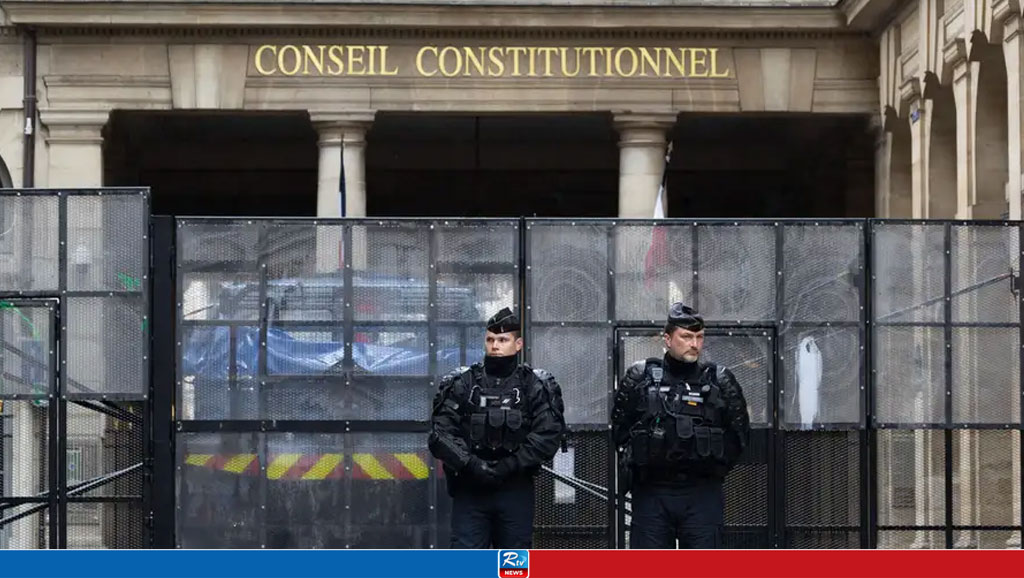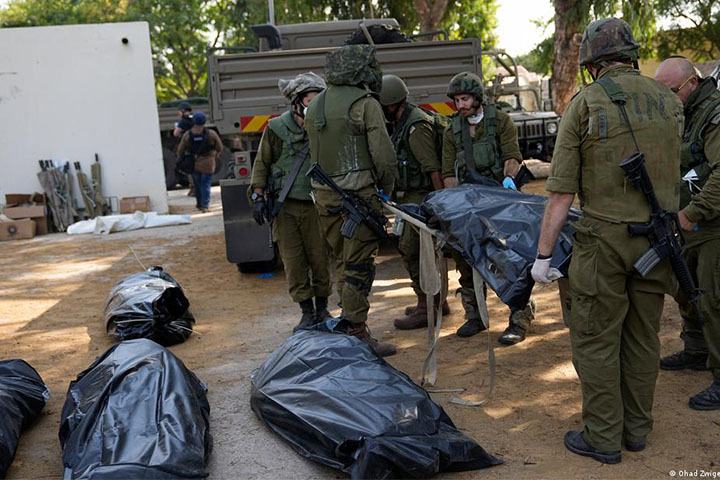Ukraine: Zelenskyy rules out peace talks for now
President Zelenskyy has rejected calls for peace talks with Russia while meeting with a delegation of African leaders. Meanwhile, Russian President Putin said nuclear warheads are now in Belarus.
A delegation of African leaders met with Ukrainian President Volodymyr Zelenskyy in Kyiv on Friday as part of a peace mission to Ukraine and Russia.
Zelenskyy said after talks that he had invited African leaders to join a global peace summit. But he said he would not open peace talks with Moscow yet, saying that peace was reliant on a full withdrawal of Russian troops from occupied territory.
"I clearly said several times at our meeting that to allow any negotiations with Russia now that the occupier is on our land is to freeze the war, to freeze pain and suffering," he told reporters.
Earlier in the day, air raid sirens sounded and at least two explosions shook Kyiv as the African leaders arrived in the Ukrainian capital.
Kyiv Mayor Vitali Klitschko said the explosions came from Ukrainian air defenses, which Ukraine says downed 12 missiles, including six Kalibr cruise missiles and six hypersonic Kinzhal missiles, plus two drones.
Images posted by the Ukrainian Interior Ministry showed damaged homes in the wider Kyiv region.
"Russian missiles are a message to Africa: Russia wants more war, not peace," Ukrainian Foreign Minister Dmytro Kuleba tweeted.
South African President Cyril Ramaphosa, who was visiting Ukraine for the first time since the start of Russia's full-scale invasion of the country, will travel Saturday to St. Petersburg for talks with Russian President Vladimir Putin.
Accompanying Ramaphosa are Senegalese President Macky Sall and Zambian President Hakainde Hichilema, plus representatives of Egypt and the Comoros.
Ukraine's foreign minister said African leaders should take note of Friday's air raid on Kyiv just as they arrived.
"Putin 'builds confidence' by launching the largest missile attack on Kyiv in weeks, exactly amid the visit of African leaders to our capital," Kuleba tweeted. "Russian missiles are a message to Africa: Russia wants more war, not peace."
South African President Ramaphosa's office tweeted that the African leaders' mission was "proceeding well and as planned."
"Today as we were here, we heard of missile strikes and those types of hostilities are not good for fostering peace," Ramaphosa said after talks with Zelenskyy.
South African president calls on both sides to de-escalate
Cyril Ramaphosa, the South African president who was part of a delegation of African leaders to Kyiv, said following talks with his Ukrainian counterpart, Volodymyr Zelenskyy, that both Russia and Ukraine needed to de-escalate.
"This war must be settled and there should be peace through negotiations," he told reporters. "We argue that there must be de-escalation on both sides."
South Africa has sought neutrality on the war in Ukraine, even hosting Russian President Vladimir Putin for an international summit, amid calls for the latter's arrest on charges of war crimes from the International Criminal Court (ICC).
Ramaphosa added that African countries would be ready to continue to be a part of any future peace deal in Ukraine.
Putin announces first nuclear warheads have arrived in Belarus
During a speech in St. Petersburg, Russian President Vladimir Putin said the first Russian tactical nuclear warheads had already arrived in neighboring Belarus.
"The first nuclear warheads were delivered to the territory of Belarus... This is the first part. But by the end of summer, the end of the year, we will complete the process," he said.
Despite the announcement of warheads in Belarus, US Secretary of State Antony Blinken said that Washington would not change its stance.
"We have no reason to adjust our own nuclear posture. We don't see any indications that Russia is preparing to use a nuclear weapon," Blinken said.
The storage of nuclear weapons in Belarus, a sovereign nation that is highly dependent on Russian support, brings the threat of a nuclear strike closer to the borders of the EU.
Although Belarus has not directly supported Russia's invasion with soldiers, it allowed Russia to use its territory as a launching pad for its initial full-scale invasion last February.
Russia placing nuclear weapons in Belarus doesn't make much difference: John Erath, Centre for Arms Control Non-Proliferation
Putin gives wide-ranging speech in St Petersburg
Russian President Vladimir Putin held a speech at the annual economic forum in St Petersburg on Friday.
He discussed varied topics, from the economy, the Ukrainian counteroffensive and Russia's climate progress.
The Russian president said the economy was set to grow by 1.5% and 2% despite massive sanctions from Western countries, including a reduction in fossil fuel purchases by EU members.
He made no mention of the parts of Russian industry, such as the car industry, that have suffered heavily from sanctions.
Touching on the Ukrainian counteroffensive, which he has previously said was already failing, Putin said that Ukraine was suffering "heavy losses."
"I think that Ukraine's armed forces stand no chance here [around Zaporizhzhia], as well as in other directions — I have no doubt about that," he added.
Putin also took a dig at European countries for restarting some of their coal power plants as they weaned themselves off Russian oil and gas.
"Unlike many other states, we are fulfilling all the commitments we have taken on in this sphere. Even ahead of schedule," the Russian president said, ahead of the UN climate conference in Dubai.
US to send $205 million in humanitarian aid
Washington, one of Kyiv's biggest backers since Russia's full-scale invasion began last February, has pledged another $205 million (€187 million) in humanitarian aid.
The aid "provides the people of Ukraine with critical support, including food, safe drinking water, protection services, education, livelihoods, legal assistance, accessible shelter, health care, and more," Secretary of State Antony Blinken said on Friday.
The money would also be used to help displaced people keep in touch with their loved ones who they have been separated from.
More than 6 million people have fled Ukraine since last year, with another 5 million being internally displaced.
Blinken said that the US has provided Ukraine with over $2.1 billion in humanitarian aid and called for more donors to help out.
Counteroffensive is 'positive' but 'difficult,' Zelenskyy tells NBC
Ukrainian President Volodymyr Zelenskyy has said that success for Ukraine's counteroffensive would mean Russia ends up losing the war.
Zelenskyy gave an interview to US broadcaster NBC, telling them that the state of the counteroffensive looks "not bad."
"I would say it's generally positive, but it's difficult ... Our troops who are now at the front of the frontline are facing very tough resistance," he said.
He said the strong resistance was understandable, "Because for Russia to lose this campaign to Ukraine, I would say, actually means losing the war."
Russia committing 'horrifying' acts in Ukraine, climate activist Greta Thunberg tells DW
Swedish environmental activist Greta Thunberg said the rest of the world must step up in raising awareness about the humanitarian and environmental damage caused by the Kakhovka dam breach.
"This responsibility doesn't fall on Ukrainians. This responsibility falls on the rest of the world who are witnessing these horrifying events. And not the least on Russia who are the ones actually committing [it]," Thunberg told DW's Ukrainian service.
Thunberg was speaking from the German city of Bonn while taking part in a protest against ecocide in Ukraine. The rally took place outside the UN headquarters in Germany and a conference center where preparatory talks for the COP28 climate summit in November are being held.
"I think that the actions that Russia is doing now and has been doing for a long time are absolutely horrifying," Thunberg said.
NATO working on creating Ukraine council — Stoltenberg
NATO Secretary General Jens Stoltenberg outlined agreements reached at the end of a two-day defense ministers' meeting in Brussels on Friday.
He told journalists that a framework needs to be in place for Ukraine's future security once Russia's war on the country ends.
"We all agree that Ukraine has already moved closer to NATO over the past decade," Stoltenberg said. "We agree that NATO's door is open — that Ukraine will become a member of the alliance and that this is a decision for allies and Ukraine to make. Russia does not have a veto."
Stoltenberg said the trans-Atlantic military alliance is also working on creating a Ukraine-NATO council, working to bring Ukraine closer to NATO "in practical terms."
He also commented on Russia's "dangerous rhetoric" surrounding nuclear weapons, particularly Moscow's intention to deploy nuclear weapons to Belarus, which neighbors Ukraine.
Stoltenberg said NATO is taking Russia's announcement "seriously" and that they have "seen some preparations going on" towards following through on the deliveries to Belarus.
He added, however, that while NATO remained vigilant, the military alliance does not yet see an imminent threat from Russia to deploy those weapons.
"So far, we haven't seen any changes in the Russian nuclear posture [in terms of] deployments" which would require any changes in NATO's own posture, he said.
'Highly likely' Russia behind Ukraine dam collapse
A team of legal experts say it is "highly likely" that the breach of the Kakhovka dam in southern Ukraine was caused by explosives planted by Russians.
Legal staff from international human rights law firm Global Rights Compliance, which is implementing efforts to support accountability for atrocities in Ukraine, visited the Kherson region from June 10-11.
They were accompanied by Ukraine's prosecutor general and a team from the International Criminal Court (ICC).
"The evidence and analysis of the information available — which includes seismic sensors and discussions with top demolition experts — indicates that there is a high probability the destruction was caused by pre-emplaced explosives positioned at critical points within the dam's structure," a summary of preliminary findings seen by Reuters said.
This was based "not only on seismic sensors, and one of the leading open source intelligence providers, but also based on patterns of attack and other attacks that we have documented," according to senior lawyer Yousuf Syed Khan.
He said the finding that the dam was blown up by the Russian side "is an 80% and above determination."
The huge Soviet-era Kakhovka hydroelectric dam has been under Russian control since the invasion. It was breached in the early hours of June 6, unleashing floodwater across a swathe of southern Ukraine, destroying farmland and cutting off water supplies.
Germany to provide Ukraine with 64 more guided air defense missiles
German Defense Minister Boris Pistorius has announced the "immediate" delivery of additional missiles for Ukraine's Patriot air defense systems.
"The Federal Government has decided to immediately provide 64 further guided missiles," said Pistorius, speaking at a meeting of NATO defense ministers in Brussels on Friday.
He said it was "an important signal" of support for Ukraine's efforts to fend off Russian air attacks "in this particular phase of the war" – even as Russian cruise missiles targeted Kyiv.
The announcement came a day after the United States, the United Kingdom, Denmark and the Netherlands had pledged hundreds of additional air defense missiles to Ukraine, with actual logistics already underway and delivery set for the coming weeks.
Earlier this year, Germany provided the Ukrainian Armed Forces with one of its US-made Patriot surface-to-air missile (SAM) systems.
Russian troops promised bonuses for destroying Western tanks
Meanwhile on the frontline, the Russian Defense Ministry has promised bonuses for Russian troops who have destroyed NATO-supplied armor, including German Leopard tanks and US Bradley fighting vehicles.
"Payments are currently being made to servicemen of the Russian Federation Armed Forces who in the course of military operations destroyed Leopard tanks, as well as armored fighting vehicles made in the USA and other NATO countries," the ministry announced.
The ministry claimed that, up until the end of May, a total of 10,257 Russian personnel had been rewarded for destroying 16,001 items of Ukrainian and Western military equipment, with armored vehicles valued at 50,000 rubles ($596; €546) and tanks at 100,000 rubles ($1,195; €1,091).
On Sunday, Defense Minister Sergei Shoigu awarded the "Hero of Russia gold star" medal to soldiers who the Kremlin said had destroyed NATO-supplied equipment being used by Ukraine in its burgeoning counteroffensive.
Putin open to solutions to 'Ukrainian problem' – Kremlin
"President Putin was and is open to any contacts to discuss possible scenarios for solving the Ukrainian problem," said Kremlin spokesman Dmitry Peskov on Friday, quoted by Russian news agency Interfax as at least 12 Russian missiles targeted the Ukrainian capital, Kyiv.
Russia has repeatedly said it is open to negotiations on the condition that Ukraine recognize "new realities" on the ground. Russian forces continue to illegally occupy some 18% of internationally recognized Ukrainian territory where they are alleged to have committed war crimes.
Moscow claimed last autumn to have annexed four regions in eastern and southern Ukraine as well as the Crimea peninsula, which it seized in 2014.
Ukraine has its own peace plan which envisages the withdrawal of Russian troops from all Ukrainian land as a basis for any settlement.
17 Jun 2023,10:27




















 Live Tv
Live Tv









